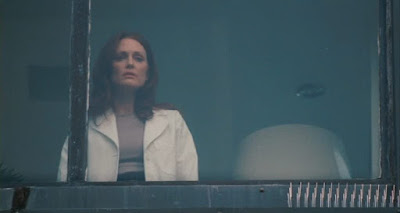Written at the time of the film's release...
Atom Egoyan's Chloe (based on the movie Nathalie...) is a throwback to the '70's, and that cusp of movie-making history before cable began making the sexually-charged obsession films that used to draw folks into the cinemas. Take a theme of Hitchcockian prurience (including a bit of his fashion sense), slime it with some DePalma directness (without the use of power-tools) and spice it with just a pinch of Kubrickian cruelty and that's Chloe.
Atom Egoyan's Chloe (based on the movie Nathalie...) is a throwback to the '70's, and that cusp of movie-making history before cable began making the sexually-charged obsession films that used to draw folks into the cinemas. Take a theme of Hitchcockian prurience (including a bit of his fashion sense), slime it with some DePalma directness (without the use of power-tools) and spice it with just a pinch of Kubrickian cruelty and that's Chloe.
Dr. Catherine Stewart (Julianne Moore) has a successful practice as a clinical OB/GYN—very clinical. "It's just the contraction of muscles," she informs a patient who's never had an orgasm. "There's nothing mysterious or magical about it."
In any Hitchcock thriller, such expert dismissal clamors for a cum-uppance.
Fact is, she's worried about her marriage to classical music scholar David (Liam Neeson). There's not a lot of communication in it. For instance, she throws a surprise party for him, which he misses completely, when he fails to catch a shuttle from New York. Smartie, smartie has a party... She's hurt, embarrassed, vulnerable, and suspicious. David's evasiveness and a happened-upon text message lads her to suspect he's having an affair, despite his protestations (well, she can see him flirting with anything in a skirt!). The couple may be talking, but nobody's listening.
A chance encounter with student-aged escort Chloe Sweeney (Amanda Seyfried, all eyes and lips) gives her an idea; she hires the young hooker to flirt with David—just to see what happens (just to confirm what she suspects in her mind). "What's the client's name?" asks the girl. "He's not the client," the doctor orders.
Of course not. That would imply somebody else has control. The situation is about her, willing to tempt fate to tempt her husband, and make concrete her suspicions. An arranged casual meeting at lunch confirms her fears—David is interested in the girl. Very interested.
This creates a series of triangulations that are liable to hurt somebody with its knife-like edges. The issues become the usual ones in sexual politics: who's in control, what's the motivation, what's the risk, who has the headache.
This would be a great deal of fun if it was more...fun. For all the frank-talk and the abundant nudity on the part of Seyfried and Moore, little is left to the imagination. And imagination is what the film is all about...or should be. In her voice-over, young Chloe boasts that she is skilled enough to become "your living, breathing...unflinching dream." It's an example of how the screenplay is clever with its words and quite precise in its usage. But it has no wit. It takes everything so seriously to the point of ludicrousness, and can't even laugh at its own contrary prudishness. It's like a partner more concerned in acting the part in their performance than with the act itself. It's not fun. Kinky for awhile, but not fun.
Some of Hitchcock's naughty sense of humor would be nice, even some of his comic mother issues, as opposed to the earnestly oppressive ones here, would have been fine. Hell, I wouldn't have minded a power-tool or two—just something a little over the top, or off of it. Something that might make it a shade more ironic, iconic or comic. It shouldn't be such a conscientiously cautionary tale. What fun is that?
Ultimately, Chloe is simply cloying. As disappointing and tasking as a bad date.







No comments:
Post a Comment